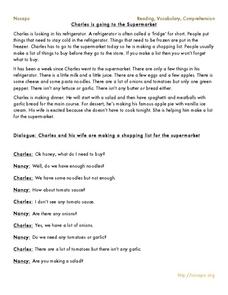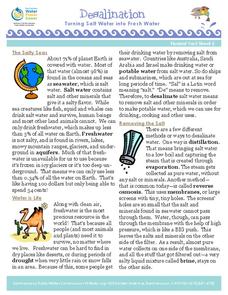Newspaper Association of America
Cereal Bowl Science and Other Investigations with the Newspaper
What do cereal, fog, and space shuttles have to do with newspapers? A collection of science investigations encourage critical thinking using connections to the various parts of the newspaper. Activities range from building origami seed...
Project WET Foundation
The Blue Planet
What a neat interactive that interacts with the amount of water on Earth's surface. It begins with a brief audio introduction of the Blue Planet and how it got its name. Then, users click on the activity to play a game that calculates...
K12 Reader
What Glaciers Leave Behind
Glaciers may seem distant and stationary, but they are huge deposits of moving ice that have made changes to the earth's surface. Your pupils can learn about the different types of impressions left by glaciers by reading the short...
K12 Reader
Where On Earth Are You?
What do we use to determine the exact locations on the earth? Your kids can learn all about compass roses and latitude and longitude. Test understanding with the five reading comprehension questions included on the page.
K12 Reader
Taking Care of Earth
Provide a brief introduction to ecology and conservation with a reading passage. Learners can read the text, answer the five related questions that are included on the page, and discuss the reading.
San Francisco Public Utilities Commission
Water from the Well
How much water does it take to brush your teeth? How about to wash your clothes? Perform an experiment that measures water usage in everyday tasks and compares them to the days before indoor plumbing, specifically the California gold...
Curated OER
The Gopher Tortoise
Can you believe the gopher tortoise was around when the dinosaurs were walking the Earth. Learn all about this creature that is one of Florida's most popular reptiles. Hands-on-activities and a glossary full of scientific terms make this...
Class Antics
Leap Year
What is a Leap Year and why do we have it? Find out with this Leap Day/Leap Year response to reading worksheet in which scholars read a short passage and use their new-found knowledge to answer five questions with short answers.
K5 Learning
Why Does the Ocean have Waves?
Six short answer questions challenge scholars to show what they know after reading an informational text that examines waves—what they are, what causes them, and how different Earth factors affect their size and strength.
San Francisco Public Utilities Commission
Hetch Hetchy: The Story of San Francisco's Water
How did San Francisco supply enough water for its residents over the last two centuries? Learn about droughts and water conservation in California, as well as specific historical events that led to the water system today. Kids read two...
San Francisco Public Utilities Commission
Pesky Plastics: The Problem with Plastic
What can happen to the environment if plastic continues to pollute it? Learners read about the implications of plastic on health, water, and nature in a two-page reading passage. After they finish reading, they work on six comprehension...
San Francisco Public Utilities Commission
What is Drought? No Rain, No Water
How can climate change affect our water supply? Have kids read a passage about the water cycle and water conservation, which includes six questions that challenge them to use context clues.
Channel Islands Film
Island Rotation: Lesson Plan 1
How do scientists provide evidence to support the theories they put forth? What clues do they put together to create these theories? After watching West of the West's documentary Island Rotation class members engage in a series of...
K12 Reader
Water Carves the Land
What affect do bodies of water have on the world around us? Kids can find out by reading this passage. After reading, they answer five questions related to the text.
Nosapo
Reading, Vocabulary, Comprehension
Whether you teach mainstream elementary classes or older English learners, a set of reading comprehension resources is a great addition to your language arts curriculum. Ten activities each include a reading passage and set of...
TLS Books
Uranus
After reading an informational text passage, learners answer four multiple choice questions about the third largest planet in our solar system.
TLS Books
Jupiter
Young astronomers read an informational text on the gas giant, Jupiter. Then they answer four multiple choice questions based on what they read.
NASA
How Does a Hurricane Form?
Young meteorologists examine the formation of a hurricane in a resource focused on severe weather conditions. Once they learn that a hurricane is also a tropical cyclone, and detail the different levels associated with tropical storms,...
San Francisco Public Utilities Commission
What is Groundwater? Our Underground Water Supply
Learn about the consequences of groundwater with a lesson about the different ways California handles water conservation and pollution. After reading a passage about the water table, learners apply what they have read to six...
San Francisco Public Utilities Commission
Desalination: Turning Salt Water into Fresh Water
How does San Francisco supply its citizens with enough water, even during a drought? Learn about reservoirs and why desalination could be a good solution with a reading passage about water conservation. After kids finish the...
K12 Reader
Rainforest Ecosystems
Rainforests are the topic of this brief reading passage. Learners can find out all about the different layers of the rainforest as well as the types of creatures that live there. After reading, they respond to five questions about the text.
K12 Reader
Natural Resources
What natural resources are available in your area? Your learners can consider this question after reading a brief passage about natural and renewable resources. After reading, class members respond to five questions related to the reading.
K12 Reader
Endangered Species
Your learners have likely heard about animals going extinct. By reading this passage, they can find out some reasons why this happens and how to protect endangered species. After reading, individuals respond to five related questions.
Lee & Low Books
Classroom Guide for Sacred Mountain: Everest
The most famous climbers of Mount Everest could never have made it to the summit without the assistance of the local Sherpa. Christine Taylor-Butler's nonfiction children's book Sacred Mountain: Everest is the focus of an extensive...
Other popular searches
- Earth Science Moon Phases
- Branches of Earth Science
- Earth Science Minerals
- Earth Science Inquiry
- Earth Science Lesson
- Earth Science Lesson Plans
- Basic Earth Science
- And Earth Science
- Earth Science Map Reading
- Earth Science and Art
- Earth Science Vocabulary
- Science Earth Layers

























